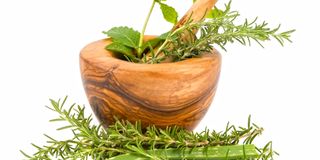If regulated, alternative medicine can boost health

Herbal medicine and a mortar and pestle.
Scientific Reports recently brought to light a remarkable behaviour: The first documented case of an orangutan treating its wound with a medicinal plant. The ape, in Indonesia, also rested after the treatment, pointing at the importance of rest in healing.
The wound closed and healed in a few weeks.
This natural healthcare behaviour is a powerful metaphor for the potential of human beings empowered through primary healthcare (PHC), which is about providing individuals and communities with the knowledge, tools and resources to take control of their health destinies.
An orangutan, through its innate instincts, utilising natural remedies to manage its health underscores the potential for humans to achieve significant strides in the management of their individual health. Integration of traditional medicine—or complementary and alternative medicine—into the PHC system, which is cost-effective and culturally resonant, would thus significantly strengthening the system.
Many rural folk rely on herbal products for their healthcare needs; hence, complementary and alternative medicine is already a component of PHC. But this aspect is often overlooked.
Traditional medicine is not a relic of the past; it is a living, breathing repository of knowledge passed down generations, woven into the fabric of society, offering accessible and affordable care that aligns with local beliefs and customs.
The innovative integration of traditional health interventions into PHC is not just a nod to cultural practices; it is a strategic move to enhance the health outcomes of communities. This is proved by the improvement registered in skilled delivery indicators after the training and supervision of traditional birth attendants (TBAs) in regions where access to skilled healthcare providers during childbirth was limited.
Challenges include loopholes in legislation and regulation, allowing unqualified practitioners. The integration requires a thoughtful blending of science and tradition, rigorous validation of practices and a framework that respects and preserves indigenous knowledge while ensuring patient safety. In-depth research in traditional herbs, scientifically studying their properties, efficacy and safety, will ensure high quality, purity and appropriate usage.
The detrimental effects of climate change jeopardise availability and sustainability of herbal remedies, key components of alternative medicine. Environmental degradation reduces medicinal plant availability. The health sector should, therefore, prioritise preserving, distributing and sustaining indigenous trees and medicinal plants vital for traditional medicine.
Mr Omar is the CECM for Health, Garissa County. [email protected].





